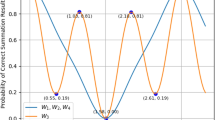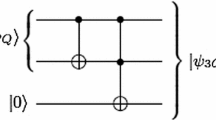Abstract
We present a device-independent quantum bit-wise XOR summation protocol based on a pseudo-telepathy multi-partite GHZ game proposed by Brassard et al. In this game, n participants can win the game with certainty with a quantum strategy, but using any classical strategy, they can only win the game with a probability that differs from 1/2 by more than a fraction that is exponentially small in the number of participants. We also analyse the correctness and security of the proposed protocol, showing that it can resist well-known outside and participant attacks.
Similar content being viewed by others
Explore related subjects
Discover the latest articles and news from researchers in related subjects, suggested using machine learning.References
Mayers, D., Yao, A.: In: Proceedings 39th Annual Symposium on Foundations of Computer Science (Cat. No. 98CB36280). IEEE, pp. 503–509 (1998)
Acín, A., Massar, S., Pironio, S.: Efficient quantum key distribution secure against no-signalling eavesdroppers. New J. Phys. 8(8), 126 (2006)
Acín, A., Brunner, N., Gisin, N., Massar, S., Pironio, S., Scarani, V.: Device-independent security of quantum cryptography against collective attacks. Phys. Rev. Lett. 98(23), 230501 (2007)
Pironio, S., Acin, A., Brunner, N., Gisin, N., Massar, S., Scarani, V.: Device-independent quantum key distribution secure against collective attacks. New J. Phys. 11(4), 045021 (2009)
McKague, M.: Device independent quantum key distribution secure against coherent attacks with memoryless measurement devices. New J. Phys. 11(10), 103037 (2009)
Masanes, L., Pironio, S., Acín, A.: Secure device-independent quantum key distribution with causally independent measurement devices. Nat. Commun. 2, 238 (2011)
Barrett, J., Colbeck, R., Kent, A.: Memory attacks on device-independent quantum cryptography. Phys. Rev. Lett. 110(1), 010503 (2013)
Lim, C.C.W., Portmann, C., Tomamichel, M., Renner, R., Gisin, N.: Device-independent quantum key distribution with local Bell test. Phys. Rev. X 3(3), 031006 (2013)
Vazirani, U., Vidick, T.: Fully device independent quantum key distribution. Commun. ACM 62(4), 133–133 (2019)
Kaniewski, J., Wehner, S.: Device-independent two-party cryptography secure against sequential attacks. New J. Phys. 18(5), 055004 (2016)
Silman, J., Chailloux, A., Aharon, N., Kerenidis, I., Pironio, S., Massar, S.: Fully distrustful quantum bit commitment and coin flipping. Phys. Rev. Lett. 106, 220501 (2011)
Adlam, E., Kent, A.: Device-independent relativistic quantum bit commitment. Phys. Rev. A 92, 022315 (2015)
Aharon, N., Massar, S., Pironio, S., Silman, J.: Device-independent bit commitment based on the CHSH inequality. New J. Phys. 18(2), 025014 (2016)
Ribeiro, J., Thinh, L.P., Kaniewski, J.M.K., Helsen, J., Wehner, S.: Device independence for two-party cryptography and position verification with memoryless devices. Phys. Rev. A 97, 062307 (2018)
Zhou, L., Sheng, Y.B., Long, G.L.: Device-independent quantum secure direct communication against collective attacks. Sci. Bull. 65(1), 12 (2020)
Roy, S., Mukhopadhyay, S.: Device independent quantum secret sharing in arbitrary even dimension. Phys. Rev. A 100(1), 012319 (2019)
Brassard, G., Broadbent, A., Tapp, A.: In: WADS (2003)
Boyer, M.:Extended GHZ n-player games with classical probability of winning tending to 0, eprint. arXiv:quant-ph/0408090v4 (2004)
Heinrich, S.: Quantum summation with an application to integration. J. Complex. 18(1), 1 (2002)
Heinrich, S., Novak, E.: On a problem in quantum summation. J. Complex. 19(1), 1 (2003)
Heinrich, S., Kwas, H., Wozniakowski, M.: Quantum Boolean summation with repetitions in the worst-average setting. arXiv:quant-ph/0311036 (2003)
Du, J.Z., Chen, X.B., Wen, Q.Y., Zhu, F.C.: Secure multiparty quantum summation. Acta Phys. Sin. 56(11), 6214 (2007)
Chen, X.B., Xu, G., Yang, Y.X., Wen, Q.Y.: An efficient protocol for the secure multi-party quantum summation. Int. J. Theor. Phys. 49(11), 2793 (2010)
Lo, H.K.: Insecurity of quantum secure computations. Phys. Rev. A 56, 1154 (1997)
Crépeau, C., Gottesman, D., Smith, A.: In: Proceedings of the Thiry-Fourth Annual ACM Symposium on Theory of Computing (ACM, 2002), pp. 643–652
Chau, H.F.: Quantum-classical complexity-security tradeoff in secure multiparty computations. Phys. Rev. A 61, 032308 (2000)
Ben-Or, M., Crepeau, C., Gottesman, D., Hassidim, A., Smith, A.: In: 47th Annual IEEE Symposium on Foundations of Computer Science, 2006. FOCS’06. IEEE, pp. 249–260 (2006)
Smith, A.: Multi-party Quantum Computation. arXiv:quant-ph/0111030 (2010)
Zhang, C., Sun, Z., Huang, Y., Long, D.: High-capacity quantum summation with single photons in both polarization and spatial-mode degrees of freedom. Int. J. Theor. Phys. 53(3), 933 (2014)
Zhang, C., Sun, Z.W., Huang, X., Long, D.Y.: Three-party quantum summation without a trusted third party. Int. J. Quantum Inf. 13(02), 1550011 (2015)
Zhang, C., Situ, H., Huang, Q., Yang, P.: Multi-party quantum summation without a trusted third party based on single particles. Int. J. Quantum Inf. 15(1), 1750010 (2017)
Shi, R.H., Mu, Y., Zhong, H., Cui, J., Zhang, S.: Sci. Rep. 6, 19655 (2016)
Shi, R.H., Zhang, S.: Secure multiparty quantum computation for summation and multiplication. Quantum Inf. Process. 16(9), 225 (2017)
Liu, W., Wang, Y.B., Fan, W.Q.: An novel protocol for the quantum secure multi-party summation based on two-particle bell states. Int. J. Theor. Phys. 56(9), 2783 (2017)
Yang, H.Y., Ye, T.Y.: Secure multi-party quantum summation based on quantum Fourier transform. Quantum Inf. Process. 17(6), 129 (2018)
Ramzan, M.: Three-player quantum Kolkata restaurant problem under decoherence. Quantum Inf. Process. 12(1), 577 (2013)
Sharif, P., Heydari, H.: In: AIP Conference Proceedings (American Institute of Physics, 2012), pp. 492–496
Kastampolidou, K., Papalitsas, C., Andronikos, T.: DKPRG or how to succeed in the kolkata paise restaurant gamevia TSP. arXiv preprint arXiv:2101.07760 (2021)
Šupić, I., Coladangelo, A., Augusiak, R., Acín, A.: Self-testing multipartite entangled states through projections onto two systems. New J. Phys. 20(8), 083041 (2018)
Breiner, S., Kalev, A., Miller, C.A.: Parallel self-testing of the GHZ state with a proof by diagrams. arXiv preprint arXiv:1806.04744 (2018)
Hoeffding, W.: In: The Collected Works of Wassily Hoeffding (Springer, 1994), pp. 409–426
Serfling, R.J.: Probability inequalities for the sum in sampling without replacement. Ann. Stat, pp. 39–48 (1974)
Cavalcanti, D., Brandão, F.G., Cunha, M.T.: Are all maximally entangled states pure? Phys. Rev. A 72(4), 040303 (2005)
Acknowledgements
This work is supported by the National Natural Science Foundation of China (Grant Nos. 61902132, 11647140), the Guangdong Basic and Applied Basic Research Foundation (Grant No. 2021A1515011985), and the Natural Science Foundation of Guangdong Province of China (Grant No. 2018A030310147).
Author information
Authors and Affiliations
Corresponding author
Additional information
Publisher's Note
Springer Nature remains neutral with regard to jurisdictional claims in published maps and institutional affiliations.
Rights and permissions
About this article
Cite this article
Zhang, C., Wei, T. Secure device-independent quantum bit-wise XOR summation based on a pseudo-telepathy game. Quantum Inf Process 21, 82 (2022). https://doi.org/10.1007/s11128-022-03426-8
Received:
Accepted:
Published:
DOI: https://doi.org/10.1007/s11128-022-03426-8




